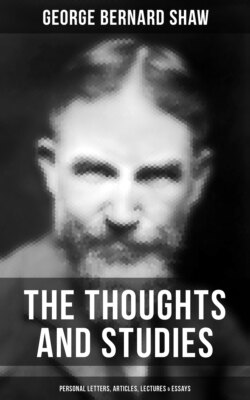Читать книгу The Thoughts and Studies of G. Bernard Shaw: Personal Letters, Articles, Lectures & Essays - George Bernard Shaw - Страница 14
На сайте Литреса книга снята с продажи.
THE OBJECTIVE ANTI-IDEALIST PLAYS
ОглавлениеTable of Contents
Ibsen had now written three immense dramas, all dealing with the effect of idealism on individual egotists of exceptional imaginative excitability. This he was able to do whilst his intellectual consciousness of his theme was yet incomplete, by simply portraying sides of himself. He has put himself into the skin of Brand and Peer Gynt. He has divided himself between Maximus and Julian. These figures have accordingly a certain direct vitality which we shall find in none of his later male figures until it reappears under the shadow of death, less as vitality than as mortality putting on immortality, in the four great plays with which he closed and crowned his life’s work. There are flashes of it in Relling, in Lôvborg, in Ellida’s stranger from the sea; but they are only flashes: henceforth for many years, indeed until his warfare against vulgar idealism is accomplished and a new phase entered upon in The Master Builder, all his really vivid and solar figures are women. For, having at last completed his intellectual analysis of idealism, he could now construct methodical illustrations of its social working, instead of, as before, blindly projecting imaginary personal experiences which he himself had not yet succeeded in interpreting. Further, now that he understood the matter, he could see plainly the effect of idealism as a social force on people quite unlike himself: that is to say, on everyday people in everyday life: on shipbuilders, bank managers, parsons, and doctors, as well as on saints, romantic adventurers, and emperors.
With his eyes thus opened, instances of the mischief of idealism crowded upon him so rapidly that he began deliberately to inculcate their lesson by writing realistic prose plays of modem life, abandoning all production of art for art’s sake. His skill as a playwright and his genius as an artist were thenceforth used only to secure attention and effectiveness for his detailed attack on idealism. No more verse, no more tragedy for the sake of tears or comedy for the sake of laughter, no more seeking to produce specimens of art forms in order that literary critics might fill the public belly with the east wind. The critics, it is true, soon declared that he had ceased to be an artist; but he, having something else to do with his talent than to fulfil critics’ definitions, took no notice of them, not thinking their ideal sufficiently important to write a play about.
